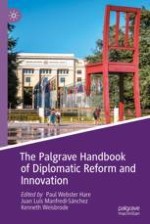2023 | OriginalPaper | Chapter
10. From Great Expectations to Dwindling Status: Brazilian Diplomacy’s Response to Post-Cold War Upheavals
Authors : Rogério de Souza Farias, Antônio Carlos Lessa
Published in: The Palgrave Handbook of Diplomatic Reform and Innovation
Publisher: Springer International Publishing
Activate our intelligent search to find suitable subject content or patents.
Select sections of text to find matching patents with Artificial Intelligence. powered by
Select sections of text to find additional relevant content using AI-assisted search. powered by
